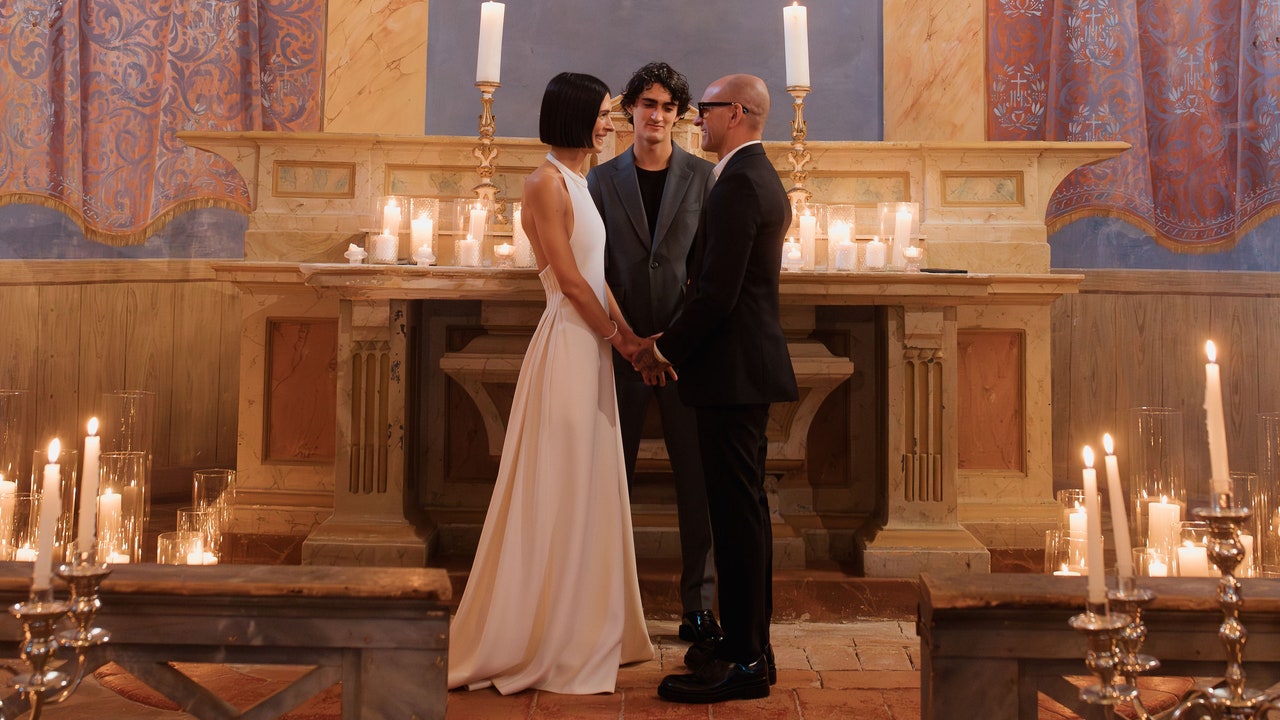Getting married? There’s a 99% chance that some people in your life are not invited to your wedding—after all, crafting the guest list is one of the hardest parts of wedding planning for a reason. It’s likely you and your partner have had to make some tough calls to shorten the guest list for the sake of your budget or capacity of your venue. Perhaps the most difficult part is knowing that you’ll have to leave some people off, no matter how much you’d love to have them there. Sometimes, your parents (if they are paying) might insist on inviting a large group from their circle—leaving some of your own friends booted from the list. In other cases, your ceremony space just can’t fit an extra couple. These decisions are always difficult, but what’s even more difficult is when a person who’s not invited to the wedding brings it up.
Etiquette demands that you be honest, straightforward, and mindful of those uninvited friends’ feelings, according to Lizzie Post (great-great-granddaughter of etiquette extraordinaire Emily Post) and Marcy Blum, world-famous wedding planner of over 35 years. Ahead, the two share some of their etiquette tips for handling those not invited to the wedding to avoid potentially awkward situations that could hurt people on either side of the invitation.
1. Your friends know not everyone can be invited to a wedding.
It’s important for uninvited guests to remember that a lack of invitation is usually not about you. “We are all adults and we should know that we can’t all be invited to every single wedding of our friends or family members,” says Post. “I think when it comes to weddings, you absolutely have to consider the fact that the bride and groom are dealing with vendor capacity limits and they’re dealing with their parents’ requests—and the parents are paying. So sometimes, they may have to invite a blood relative they don’t see so often over you simply because they are obligated by their family.”
2. Be open and honest with uninvited friends.
If you don’t think you’re invited to a wedding, making the decision to ask the couple about it is a risk. “Like most things in life, you have to try to be as graceful as possible and decide, is this a friendship destroyer? Or, can you find it in your heart to understand and let it go? That is a case-by-case decision,” says Blum. It’s often best to put yourself in the couple’s shoes. “I really encourage guests and those who know friends who are not invited to the wedding to remember that this decision probably had very little to do with how much the bride or groom wanted you there and that it was probably a matter of logistics.”
If asked this question as to-be-wed, it’s important to be open and honest in your conversation. “As you get older and smarter, you realize nothing makes it worse than not facing it. Take the friend out to lunch and say, ‘Listen, I know this really sucks. I’m sorry. I don’t want a gift from you. I don’t want anything. I just want to make sure that we’re still friends.’”
3. Budget and space issues are valid reasons to not invite people.
If you can’t invite someone due to budget or space, it’s perfectly acceptable to give that reason.“If it is, which often it is a budget or space issue, just be very honest,” says Blum. Recommends Post, “If you try to take the emotions out of it, it’s much more about being practical—they only have so many seats to work with, they have a small budget, etc. Don’t take it too personally if you weren’t invited.”
4. It’s okay to accept a gift without offering an invitation in return.
“If the uninvited friend or family member sends a gift, you should definitely thank them,” says Post. “The non-invite might be something that the bride or groom and friend may talk about, but there’s no obligation. As a bride or groom, you really should think about your relationship with that person, but really at the end of the day, it’s your guest list, you are hosting, and it’s ultimately up to you and you don’t have to explain yourself.”
She adds, “If you assess the situation and realize that person is particularly sensitive or it seems confusing, all you have to say is something like, ‘I really love you and wanted you to be there, but, unfortunately, we had to make some really tough decisions and not being able to invite you was one of them and I hope you understand that.’”
5. It’s important to stand your ground with plus ones.
Another issue that might arise is if you invite a friend but don’t give them a plus one. Blum shares, “What we see happening all the time is people saying, ‘Oh, I’ve been going out with this guy for a month and you didn’t give me a plus-one, that must have been a mistake, right?’ And you respond with ‘No, that was on purpose, because unless you’re living with someone or you’re engaged, we’re not giving plus-ones.’ You can’t be intimidated, because if you are, you’re going to wind up with another 400 guests that you didn’t have in mind.”
6. Think of ways to include the non-invited guests in your celebrations.
Having an issue with venue capacity at your wedding doesn’t mean you can’t celebrate with the friends who couldn’t make the guest list. “If you had something like 30 people that you weren’t able to invite to your wedding and you feel like you really want to celebrate with them and you feel bad, throw a second reception,” suggests Post. “That can mean a potluck, it can mean a backyard barbecue, it can mean a cocktail party—it’s whatever you want it to be. If it’s a small number of uninvited friends or family members, just have a lovely, intimate dinner all together a month or two after the wedding.”
7. Be gentle with people’s feelings.
“[As a guest], I think it’s better to reach out and go ‘Look, I know you’re getting married. I’m so happy for you. I understand I’m not invited and I assume there are all sorts of reasons and it’s fine. And I just want you to know, I don’t want it to be weird,’” says Blum. “There’s very little to be lost by taking the high road.”




